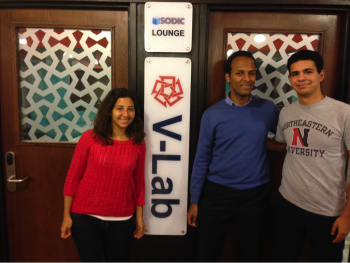by Habib El Magrissy
 When Professor Minard announced the $10,000 impact-investing program in the Fall, my first thought was of Egypt. This program seemed like a rare opportunity to use my position as a student at a leading US university to directly impact my home country. I immediately asked if there were any geographical restrictions on where this capital could be deployed, and when Prof. Minard confirmed that there were none, the start of a long and ultimately successful process began.
When Professor Minard announced the $10,000 impact-investing program in the Fall, my first thought was of Egypt. This program seemed like a rare opportunity to use my position as a student at a leading US university to directly impact my home country. I immediately asked if there were any geographical restrictions on where this capital could be deployed, and when Prof. Minard confirmed that there were none, the start of a long and ultimately successful process began.
Spurred by my desire to see this grant go to an Egyptian organization, I reached out to friends and former colleagues in Egypt to get an on-the-ground perspective. After the 2011 Egyptian revolution, social entrepreneurship exploded in Egypt; riding the wave of change that swept the country. Cairo is home to the Middle East’s first social enterprise accelerator, Nahdet el Mahrousa, part of a vibrant and growing social entrepreneurship ecosystem. Over 30 social enterprises have gone through Nahdet el Mahrousa’s program, spanning sectors from agriculture to the arts. The American University in Cairo (AUC) Venture Lab also supports student social entrepreneurs, and a team from AUC was a finalist for the Hult Prize. My initial research yielded no shortage of deserving organizations.
However, this was a team project, and there are countless social enterprises around the world deserving of a $10,000 grant. My team members Cassie, Stephen and Calvin all brought excellent ideas to the table, and we quickly narrowed our investment focus to social enterprises using innovative technology and market-oriented approaches to help the world’s poorest populations lift themselves out of poverty. We also conjured up an investment strategy that paid homage to our theoretical fund name: as Match Impact, we committed to “matching” nascent social enterprises with mature ones that had successfully scaled a similar model in a another country. In this way, we arrived at the three pillars of our investment strategy: existing proof of concept, technology for social good, and ecosystem change.
The social enterprise we chose, Madad, ticked all of these boxes. Madad, meaning “to support” in Arabic, is an online crowdfunding platform that connects donors with high-impact development projects in Egypt. Using a model similar to Indiegogo (the mature social enterprise that we “matched” as the existing proof of concept), the Madad team identifies only transparent, sustainable and long-term development projects working in one of six sectors in Egypt: education, health, poverty alleviation, the environment, women and children. When we found Madad, the organization was seeking to raise 1 million Egyptian pounds (roughly $140,000). This fit right in the range where the SEI grant would be meaningful.
Three grueling Skype interviews and many more e-mails with Madad’s founders later, our due diligence was complete. Sameh Awad, Madad’s CEO, allowed us to go through everything from his business plan to his financial projections and drill him on the specifics, and the results were encouraging. He demonstrated a clear future strategy and the grant was poised to have a catalytic effect on Madad’s growth. All that remained was to convince our classmates and the judges.
Drawing on the diverse strengths of our team, we were able to make a compelling case. As anticipated, the most prominent concern with the idea of investing in Egypt was the country risk- Egypt is going through a tough rebuilding and transitional period, resulting in an uncertain investment environment. As a result, we had to be well prepared to offer evidence pointing to Egypt’s economic recovery and optimistic projections for the coming year. In addition, I was able to secure a commitment from a Cairo-based family foundation to match the SEI grant in Egyptian pounds, leveraging local capital to complement the international funding.
Every single social enterprise presented in our class would have been worthy of the grant. Simply being part of the class and witnessing all of the teams’ presentations was a healthy learning experience. In the end, Madad was awarded $5,000, with Violet Health in India the other winner. Our work over the course of the semester had resulted in a concrete, measurable and impactful outcome.
On a personal level, contributing to the direct support of an Egyptian social enterprise was extremely rewarding. When I returned to Egypt for the winter holidays, I met with the Madad team and officially handed over the Egyptian grant of 5,000 EGP. We are now in discussions to expand the partnership between Northeastern University and social enterprises in Egypt through international co-ops and other SEI programs. I am hopeful that this grant will be the start of a long-term collaboration between my two worlds, further growing social enterprise in Egypt and providing new international opportunities for Northeastern students. I benefited immensely from SEI programs throughout my time at Northeastern, and it is with great pride that I look back knowing that I used these experiences to have a positive effect on social enterprise in my country of Egypt.


